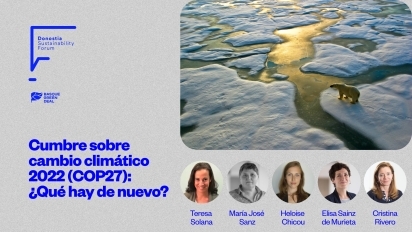The COP27 climate change summit. What's new?
COP27 was held in Sharm El Sheikh, Egypt, from 6th to 12th November 2022. It was the second best-attended summit after the Glasgow event in 2021 and the fifth to be held in Africa, one of the continents most vulnerable to the impact of climate change. DSF brought together a panel of experts to analyse the agreement reached in Egypt, from different points of view.

The summit was held in a complicated international and geopolitical context, marked by the war in Ukraine, the energy crisis, food security problems and an inflationary economic situation, as Teresa Solana, Coordinator of International Affairs at the Spanish Climate Change Office explained. The result of the summit has had both positive and negative sides. On the one hand, the agreement has been clearly inadequate in terms of climate ambition, even though important agreements reached in Glasgow were ratified: the commitment to a 45% cut in emissions by 2030 in comparison with 2010 levels, a clear call to countries to present more ambitious goals and the commitment to gradually reduce the use of coal and cut aid to fossil fuels.
Among positive aspects, on the other hand, Solana emphasised the approval of a "new solidarity agenda" to meet the needs of the most vulnerable countries by setting up new financial mechanisms. A highlight among these is the creation of a specific fund to cope with loss and damage due to the impacts of climate change, a historic demand of the most vulnerable countries. The term "loss and damage" refers to the impacts of climate change that are not or cannot be avoided by efforts to adapt and cut emissions.
The debate on financing was also taken further, recognising that responding to the climate crisis calls for an unprecedented mobilisation of financial flows. Within this debate, the door was opened up to reforming the international financial architecture to provide a response to current crises. The summit also made progress in technical aspects related to a fair transition, gender action plans, frameworks for transparency and the role that can be played by nature, an important issue given the forthcoming COP15 Biodiversity Agreement conference.
COP27 and adaptation
The summit in Egypt has often been spoken of as the African COP, and as such adaptation played an unusually important part. María José Sanz, Scientific Director of BC3, the Basque Centre for Climate Change, explained that the Paris Agreement established the need to define a global target for adaptation, in order to develop capacities, boost resilience and reduce vulnerability to climate change. However, while the mitigation or reduction of emissions can be measured, assessing progress in the area of adaptation is much more complex. At COP26 a programme of work to boost action on adaptation was started up. While the programme was originally envisaged as running for 2 years, a decision was taken to speed up its work and achieve an intermediate result with the aim of boosting urgency and being able to report the initial global balance envisaged for the coming year, which will be the first collective effort to assess progress within the framework of the Paris Agreement.
The importance of non-state actors
The role of states in international negotiations on climate change is obvious, but it must not be forgotten that many climate policies are developed and implemented at regional and local level. Heloise Chicou, head of the climate programme at Regions4 Sustainable Development, described the growing visibility of non-state actors such as regional and local governments at the COP events. Among other regional initiatives, Chicou presented the Rabat-Salé-Kénitra Declaration, signed by 48 regional governments, calling for formal recognition of the contribution made by these governments to the multilateral process, the intensification of effective multi-tier cooperation and the setting up of mechanisms to foster this coordination, at the same time calling for financial institutions to increase their activities in developing countries, not forgetting finance at sub-national level.
With regard to the private sector, Cristina Rivero, Director of the Department of Industry, Energy, Environment and Climate at the Spanish business confederation CEOE, emphasised the part this body has to play in the processes of innovation and development of new technologies for decarbonisation by 2050. In this respect, she made no secret of a certain disappointment at the lack of recognition of the contribution to be made by the private sector, in addition to its contribution to financing.
On the positive side, Rivero commented that a range of initiatives were approved in Egypt, like the declaration including a firm commitment by over 200 companies and organisations with the aim of limiting global warming to 1.5ºC. Another example of this kind of initiative, arising in parallel to the negotiations, is the proposal by the USA to set up a new voluntary emissions trading market to drive and speed up private investment in clean energy projects in developing countries. Rivero also emphasised the importance of publication of the report by the UN Group of Experts to prevent greenwashing with climate commitments and verification of the net zero targets announced by companies.

